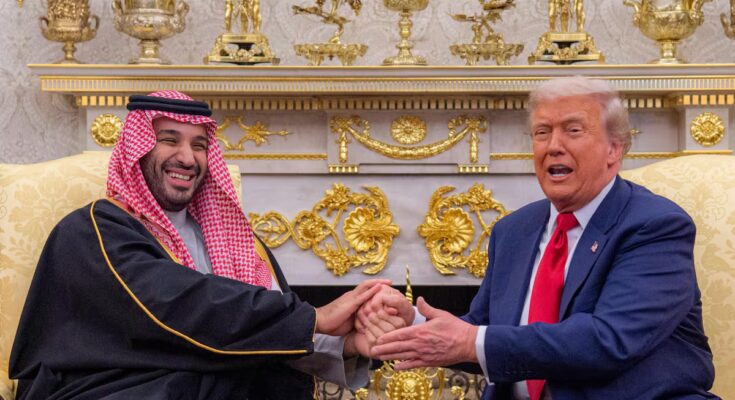A year after the brutal murder of Jamal Khashoggi – suffocated in the Saudi consulate in Istanbul and then dismembered to dispose of his body – the journalist’s friends and colleagues gathered in the last place where he was seen alive. The vigil, held in front of the Saudi diplomatic mission, was attended by intellectuals and human rights defenders; dissidents from various authoritarian countries in the Middle East – who at the time found refuge in Türkiye; then-Special Rapporteur Agnès Callamard, whose investigation directly linked Saudi Crown Prince Mohammed bin Salman to the murder; and Jeff Bezos, then the richest man in the world and owner of Washington Postfor which Khashoggi wrote. Everyone agreed that, even in death, the journalist had dealt a heavy blow to Saudi absolutism by showing the world the true and cruel face of its strong man, condemning him to become an outcast. They couldn’t have been more wrong.
Money is money, oil is oil and Saudi Arabia is a large, influential and powerful country in the Middle East and around the world. So Bin Salman – or MBS, as he is popularly known – only had to wait for the storm of controversy to calm down so that the current of realpolitik could bring things back to normal. Countries, initially full of shame, have resumed signing agreements, making deals and selling weapons, now without any scruples. Bezos himself, who promised to support justice and the search for truth – the whereabouts of Khashoggi’s remains are unknown – and who even accused MBS of hacking his phone, has done important business with the Saudis (Amazon has strengthened its presence in the country through huge investments).
The first to offer MBS a lifeline was Vladimir Putin: two months after the brutal assassination, the Russian president warmly welcomed him at a G20 meeting in Argentina, during which almost all other leaders present tried to avoid him. The close relationship between Putin and Bin Salman has led both countries to act in concert on energy issues (including Saudi funds investing in Russia) and geopolitical issues, such as the war in Libya, Riyadh’s rapprochement with the Assad regime before its fall last year, and inviting Saudi Arabia to join the BRICS group.
In the case of the United States, Donald Trump was very careful not to be seen with MBS after the murder, especially after the CIA itself confirmed that it was the crown prince who ordered Khashoggi’s execution due to his growing criticism of Saudi absolutism. However, contacts with the Saudis did not cease, as Riyadh’s mediation was crucial for one of Trump’s flagship projects: the Abraham Accords to normalize relations between Middle Eastern states and Israel. With his successor, Joe Biden, in office, public contacts with MBS resumed; the man who really holds power in Saudi Arabia, even though his father, Salman bin Abdulaziz, is the official head of state.
European countries have not lagged behind in restoring MBS, and not only because of their interest in hydrocarbons. Saudi Arabia has been one of the world’s largest arms buyers for over a decade. “Saudi Arabia’s main suppliers between 2020 and 2024 were the United States (74%), followed by Spain (10%) and France (6.2%),” highlights the Stockholm International Peace Research Institute (SIPRI). French President Emmanuel Macron has met with MBS on several occasions, and Spanish Prime Minister Pedro Sánchez will also visit him in 2024. As early as 2018, Sánchez justified the continued sale of military equipment to Saudi Arabia – despite the Khashoggi case and its use in wars such as the one in Yemen – by citing the “defense of Spanish interests” through the preservation of jobs.
Turkey was the last country to withdraw. To demonstrate what happened at the Saudi consulate, Recep Tayyip Erdoğan’s government shared audio and video recordings with its allies – even at the risk of admitting to openly spying on foreign diplomatic missions on its territory – and argued for the need to criminally prosecute the masterminds behind the assassination. As a result, Ankara found itself embroiled in a sort of cold war with the Saudis, which led them to support opposing sides from Libya to the Indian Ocean.
Finally, in 2022, the Turkish court that tried the defendants for Khashoggi’s murder in absentia threw in the towel and accepted the prosecution’s request to suspend the proceedings and transfer them to Saudi Arabia. This came at a time when the Turkish government was trying to break its international isolation to overcome a critical economic situation. Since then, trade relations with Riyadh – including arms sales – have normalized, the Saudi Central Bank signed a currency swap agreement that has helped stabilize the Turkish lira, and both capitals have increased political cooperation in areas such as Syria and Palestine.
As such, Trump’s state dinner for Bin Salman on Tuesday in Washington was simply a reenactment of what has been happening for years. Amidst much glitz and glamour, the most powerful men in the world celebrated the strongman of the Saudi monarchy. Trump and senior officials from his administration, representing the executive branch, were present. On the economic side, among the many participants were Elon Musk and Apple CEO Tim Cook. And the world of sport – which has done so much to erase the image of the Saudi dictatorship – was represented by FIFA president Gianni Infantino and former Real Madrid star Cristiano Ronaldo, now captain of Al-Nassr, owned by the Saudi sovereign fund PIF, chaired by Bin Salman. Trump warmly thanked the footballer, his son Barron’s “favorite”, for his presence, saying that thanks to him his son “respects him more”.
In a world governed by networks of favors and personal connections between these powerful men – and in an increasingly obscene way – murders like Khashoggi’s are excesses that are forgiven over time. “Things happen,” as Trump said. And the journalists who ask for it are “insubordinate”.
Yet many people are still willing to defy the law. “Jamal fought for a democratic Middle East, where freedom of expression and of the press were respected. For his dreams he was feared. And in the end he was assassinated,” Callamard, now secretary general of Amnesty International, wrote on the social network that includes China.
Sign up to our weekly newsletter to get more English-language news coverage from EL PAÍS USA Edition



